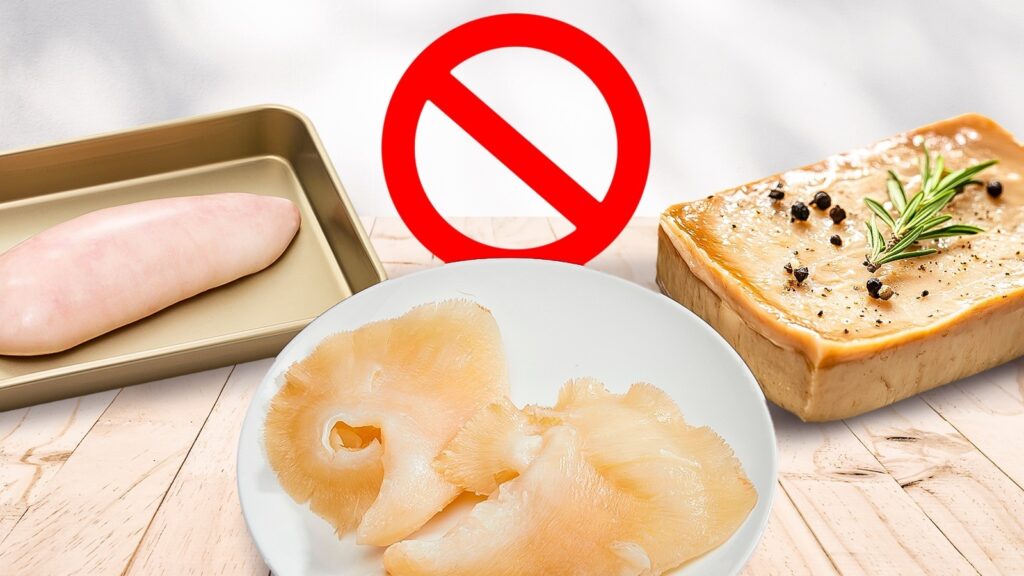
You ever crave something so bad, your mouth waters, your brain screams yes, but the law taps you on the shoulder like, “Ma’am… step away from the plate”? Yeah, welcome to the wild, twisted world where your lunch can make you a fugitive.
This ain’t about rotten meat or moldy cheese. Nah. Some foods are banned not ‘cause they’ll kill you — but because they stir up old fears, fat pockets, or centuries of tangled history.
Sounds stupid? Maybe. But food isn’t just about taste — it’s politics, religion, tradition, money — a whole damn drama served hot on your plate.
Let’s chew on this: why the hell can’t you eat a damn horse in some places, but deep-fry tarantulas in others like it’s popcorn?
It’s Not Always About Health — It’s About Power
The first thing people assume when they hear a food is “illegal” is that it’s toxic, dangerous, or riddled with parasites. And sure, sometimes that’s true. (Fugu, I’m side-eyeing you, you tetrodotoxin-filled bastard.) But other times? It’s about who’s calling the shots.
Case in point: horse meat. In the U.S., it’s taboo. Not because it’s unsafe. Not because it tastes bad. But because we grew up watching Black Beauty and riding ponies at birthday parties. Horses became friends, not food.
The emotional attachment morphed into legislation. Meanwhile, in parts of Europe and Central Asia, horse meat is gourmet. See what I mean? It’s not about danger — it’s about domestic politics wrapped in childhood memories.
Religion & Ritual: The Sacred, The Profane, and The Plate
Let’s not dance around it — religion has a chokehold on food rules. And I don’t mean that in a disrespectful way, but more like damn, this goes deep. Take pork, for instance. It’s illegal or heavily restricted in many Muslim-majority countries.
And it’s not because pigs are inherently evil or taste like sin. It’s rooted in centuries of belief systems, identity, hygiene laws from ancient times, and cultural preservation.
On the flip side? India’s beef bans aren’t about saving cows from heart attacks. Cows are sacred in Hinduism, so beef becomes a political and emotional landmine. You kill a cow there, you don’t just break a law — you risk igniting a riot. It’s more than food — it’s fuel for centuries of fire.
Protecting The “National Identity” — Aka “Don’t You Dare Touch My Culinary Flag”
Some bans are purely patriotic — like guarding a country’s culinary crown jewels. Think about Italy’s strict rules on non-traditional pizza toppings or France’s war on anything that smells “too American” in their cuisine.
These aren’t legal bans in the jail-you sense, but culturally enforced like iron-clad contracts. You walk into Naples and ask for pineapple on pizza? Be prepared to get excommunicated by someone’s nonna.
But then there are real, state-level bans — like Scotland outlawing haggis imports to the U.S. because it contains sheep lung. Is it dangerous? Not particularly.
But FDA said nope, so haggis got locked out. What’s sad? The ban doesn’t just affect health — it severs an entire group of expats from tasting a bite of their heritage.
The Big Money Bans — When Corporations Pull the Strings
Now let’s get to the juicy, greasy, money-drenched heart of the matter: economic protectionism. Some foods are banned not for your safety, but because they mess with the money trail. Raw milk is a classic battleground.
It’s illegal in many U.S. states, not because it’s always dangerous, but because pasteurization made giants rich. Raw milk farmers? Small, defiant, and very inconvenient for Big Dairy.
Or how about foie gras, banned in California and New York due to animal cruelty concerns. Sounds noble, right? But dig deeper — the ban is as much about politics and media outrage as it is about ducks. Meanwhile, fast food giants can legally sell you pink slime on a bun, no questions asked.
Makes you think, huh? Sometimes it’s not about what’s on the plate — it’s about who owns the kitchen.
When Nature Becomes Contraband: The Case of Kinder Eggs and Casu Marzu
Kinder Eggs — illegal in the U.S. for years. Not because chocolate is dangerous, but because a small toy inside posed a choking hazard. Let that sink in. Meanwhile, kids downing sugar bombs and choking on TikTok challenges daily. Priorities, y’all.
Then there’s Casu Marzu — a maggot-infested cheese from Sardinia. Yup, maggots. It’s technically illegal under EU food hygiene laws, but locals keep making it, eating it, loving it.
Why? ‘Cause for them, it’s tradition. To outsiders, it’s a dare. To officials, it’s biohazard. But what is it really? A glimpse into how “illegal” doesn’t always mean wrong. It just means misunderstood — and maybe a little gross.
What You’re Told Not to Eat Often Says More About the World Than the Food
Food laws? They’re not just about nutrition labels and safety checks. They’re love stories, fear parables, power plays, and political chess matches. They expose our soft spots — what we worship, what we fear, and what we cling to when everything else changes.
So next time someone gasps at your plate like you’ve just committed culinary heresy, ask yourself: Is it really the food that’s banned — or the idea behind it?
Because food has always been more than fuel. It’s memory. Identity. Rebellion. And sometimes, it’s illegal just ‘cause the system can’t stomach it.
“One man’s delicacy is another man’s crime scene.”
– Me, watching a tarantula kebab vendor in Cambodia with wide eyes and a half-horrified grin.









